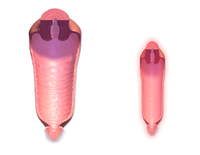
Improved correlation of urinary cytology specimens using The Paris System in biopsy‐proven upper tract urothelial carcinomas
Sign Up to like & getrecommendations! Published in 2018 at "Cancer Cytopathology"
DOI: 10.1002/cncy.22005
Abstract: Urine cytology specimens are essential for screening and monitoring high‐grade urothelial carcinomas. However, inconsistent reporting and equivocal diagnostic categories have remained a challenge. The Paris System for Reporting Urinary Cytology (TPS) was developed to provide… read more here.
Keywords: cytology specimens; urothelial carcinomas; tract; carcinomas ... See more keywords

Concordance study of PD-L1 expression in primary and metastatic bladder carcinomas: comparison of four commonly used antibodies and RNA expression
Sign Up to like & getrecommendations! Published in 2017 at "Modern Pathology"
DOI: 10.1038/modpathol.2017.188
Abstract: Therapy with anti-PD-L1 immune check-point inhibitors is approved for several cancers, including advanced urothelial carcinomas. PD-L1 prevalence estimates vary widely in bladder cancer, and lack of correlation between expression and clinical outcomes and immunotherapy response… read more here.
Keywords: concordance; urothelial carcinomas; commonly used; primary metastatic ... See more keywords

Non‐urothelial carcinomas of the bladder
Sign Up to like & getrecommendations! Published in 2019 at "Histopathology"
DOI: 10.1111/his.13719
Abstract: Non‐urothelial carcinomas involving the bladder are uncommon and often diagnostically challenging. These carcinomas may show squamous, adenocarcinomatous or neuroendocrine features, with immunohistochemical stains aiding the diagnosis in only a subset of cases. The clinical history… read more here.
Keywords: diagnosis; non urothelial; urothelial carcinomas; bladder ... See more keywords

Urothelial Carcinomas of the Urinary Bladder With Plasmacytoid or Rhabdoid Features and Tendency of Epithelial-Mesenchymal Transition in 3 Dogs
Sign Up to like & getrecommendations! Published in 2018 at "Veterinary Pathology"
DOI: 10.1177/0300985818771151
Abstract: Plasmacytoid and rhabdoid variants of urothelial carcinomas (UCs) of the urinary bladder have been described in humans with plasma cell–like or rhabdoid cellular appearance and aggressive clinical outcome. Canine UC of the bladder is generally… read more here.
Keywords: urothelial carcinomas; plasmacytoid rhabdoid; bladder; urinary bladder ... See more keywords

Contemporary best practice in the management of urothelial carcinomas of the renal pelvis and ureter
Sign Up to like & getrecommendations! Published in 2019 at "Therapeutic Advances in Urology"
DOI: 10.1177/1756287218815372
Abstract: Upper tract urothelial carcinoma (UTUC) accounts for 5% of urothelial carcinomas (UCs), the estimated annual incidence being 1–2 cases per 100,000 inhabitants. Similarly to bladder UC, divergent differentiations and histologic variants confer an adverse risk… read more here.
Keywords: best practice; urothelial carcinomas; contemporary best; management urothelial ... See more keywords

Role of lymph node dissection in the management of upper tract urothelial carcinomas: a meta-analysis
Sign Up to like & getrecommendations! Published in 2018 at "BMC Urology"
DOI: 10.1186/s12894-018-0336-5
Abstract: BackgroundLymph node dissection (LND) is not routinely performed during radical nephroureterectomy (RNU) in upper tract urothelial carcinomas (UTUC) and the role of LND has been controversial. We aim to investigate whether patients with LND had… read more here.
Keywords: node dissection; upper tract; analysis; urothelial carcinomas ... See more keywords

Morphological predictors for microsatellite instability in urothelial carcinoma
Sign Up to like & getrecommendations! Published in 2021 at "Diagnostic Pathology"
DOI: 10.1186/s13000-021-01168-2
Abstract: Introduction Microsatellite instability occurs due to a series of mutations in the DNA pairing error repair (Mismatch repair; MMR) genes, which can affect germ cells as occurs in Lynch syndrome, whose patients are at high… read more here.
Keywords: instability; urothelial carcinomas; loss mmr; mmr protein ... See more keywords